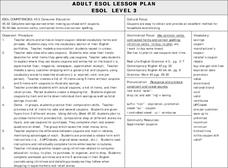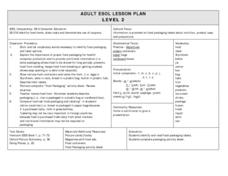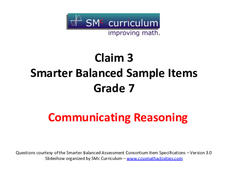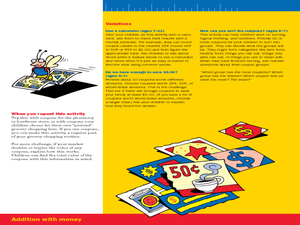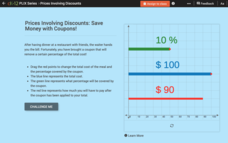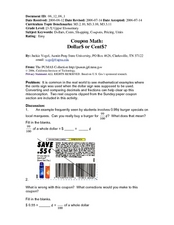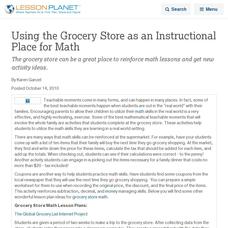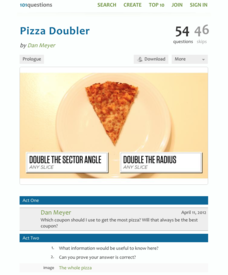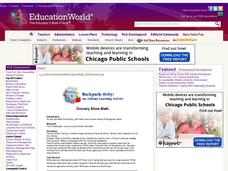101 Questions
Bed, Bath, and Beyond Coupon
More money for me! Scholars explore two different coupons for Bed Bath & Beyond, one for 20 percent off and one for $5 off an item. Using some concrete examples, they determine conditions for when each coupon would be more beneficial.
Curated OER
Cutting Costs With Coupons.
Learners clip coupons for food items, create a menu using those items, and add up the total savings. They correctly calculate the total amount of money that would be saved if they used the coupons.
Curated OER
Clipping Coupons
Students explore the use of coupons to promote cost saving and help families remain within their monthly budget. In groups students create a shopping list using coupons provided by the teacher. They record the actual cost of the item as...
101 Questions
Combining Coupons
Everyone likes to save money! Use your math skills to figure out just how much you can save on a pair of sweet shoes. A vendor is running a percent off sale, with a percent off coupon, and a specific dollar amount coupon—and lets you use...
101 Questions
What Micheal’s Coupon Should You Use?
Get your classes on their way to extreme couponing! Young mathematicians analyze two different coupon options for the better deal. They use different scenarios to predict and compare the outcomes.
Curated OER
Stretching Your Money with Coupons
Students examine ways to extend their budget with coupons. In this budgeting lesson, students read information about using coupons at the given website. Students make a list of 30-50 products they use in their homes and use online...
Illustrative Mathematics
Coupon Versus Discount
All too often stores give coupons for an item, but when you go into buy it, the item is on discount. The store won’t take the coupon if the discount is used. So what do you do, use the coupon or take the discount? This activity helps...
Concord Consortium
Zero Coupon Bond
There are zero reasons not to learn about zero coupon bonds. Given information about the interest rate and closing price of a zero coupon bond, future investors determine the purchase price of the bond. They then consider the...
Curated OER
Coupon Clippers: Understanding Comparative Shopping
Third graders participate in a shopping spree after listening to Pigs Go to Market: Fun with Math and Shopping. After the story is read aloud, 3rd graders answer discussion questions and review key vocabulary. Students complete provided...
Curated OER
Using Money
In this money worksheet, 4th graders study how coupons allow people to buy things for less than full price. Students use the information acquired to answer 3 short answer math problems.
101 Questions
Dueling Discounts
What a bargain—an informative, free resource! Given prices of several objects, learners determine whether 20 percent off or $20 off would be a better bargain. They use the results to come up with a generalization of the situation.
Curated OER
ADULT ESOL LESSON PLAN--Level 2--Consumer Education
Pupils, after reviewing an extensive list of vocabulary terms on the board, identify/label food items, how much they cost and the value of using coupons to save money. In addition, they practice reading the labels on the food packaging...
CCSS Math Activities
Smarter Balanced Sample Items: 7th Grade Math – Claim 3
Does the explanation make sense? Sample items highlight claim three, communicating reason, in the Smarter Balanced assessments. Teachers use the 16 items to help show pupils the importance of communication and reasoning within...
Curated OER
How Much Do We Save?
Students use coupons to save. In this saving lesson students practice their addition, multiplication and estimating skills with dollars and cents. They investigate grocery coupons and look for ways to save money.
CK-12 Foundation
Prices Involving Discounts: Save Money with Coupons!
Nine questions make up an interactive that challenges scholars to identify new prices after discounts. Question types include fill in the blank and multiple choice. A fully-functional tool assists participants in solving word problems....
Curated OER
Groupon Math: Dollars or Cents
For this coupon math worksheet, 9th graders read two coupons and answer 4 questions about how the coupons work. Students must write written responses to explain problems with the coupons.
Curated OER
Shopping
Students demonstrate how to count money through a simulated shopping experience. In this consumer math lesson, students read the book Just Shopping With Mom and count play money to illustrate how much the items in the book cost.
Curated OER
Using the Grocery Store as an Instructional Place for Math
The grocery store can be a great place to reinforce math lessons and get new activity ideas.
101 Questions
Pizza Doubler
Double the pizza? What a great deal! Young pizza enthusiasts investigate two different coupons, one that doubles the radius and one that doubles the sector angle of a slice. They determine which coupon is the better deal.
Curated OER
Let's Shop
Upper graders add and subtract decimals, using concrete objects and story problems. Note: The Concentration Cards and Homework assignment link at the bottom of the plan doesn't work.
Curated OER
Problem Solving
Scholars will learn to solve word problems using addition, subtraction, multiplication or division. Using a grocery store theme, they will identify the best way to solve real-life problems. There are many ways this basic instructional...
Curated OER
Ratios, Proportions and Percents
Fifth graders complete 3 activities centered around percents. In this ratios, proportions and percents lesson, 5th graders create designs on grid paper that illustrate a variety of percents, solve percent problems mentally, and use...
Curated OER
Grocery Store Math- Home/School Activity
In this home/school consumer math activity, students examine ways to save money at the grocery store. They work with a family partner to write a menu and write a shopping list. They shop for the items noting the prices and using a...
Curated OER
Math-Money
Students complete money matching worksheet. They work with an aid or peer tutor with coin tray, name each coin shown (use native language or alternative speech method). Alternative assessment methods are used.




